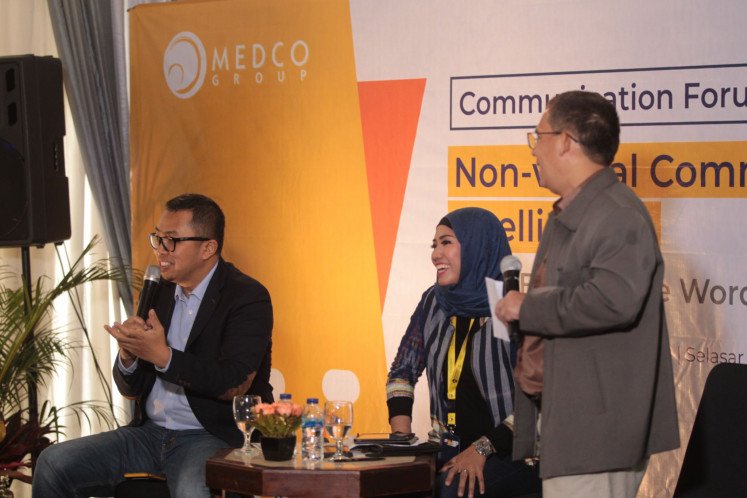July 31, 2023
JAKARTA – Family and business don’t always mix well. Successors inheriting or working for a family-owned enterprise need a clear view of the firm’s value and must solve challenges regarding their own role. Trust is a crucial currency in that context.
Nearly three quarters of Asia-Pacific family company leaders believe they have established trust among family members, according to the PwC Global Family Business Survey 2023. This implies that they are more inclined to work effectively together to achieve a common goal.
Thus, it should not come as a surprise that many family company owners prefer to have their heirs succeed them to ensure continuity. However, a Deloitte poll in 2019 revealed that only 13 percent of family businesses continue into the third generation.
The Jakarta Post has spoken to owners and heirs in Indonesia to learn about their challenges with family business.
More than just a privilege
Heading the non-energy division of Medco Group, Roni Pramaditia is one of a handful of managing directors at the prominent Indonesian company founded in 1980 by the late politician and Gorontalo native Arifin Panigoro, who happens to be Roni’s grandfather.

Acknowledging your privilege: Roni Pramaditia, pictured above in a discussion forum held in 2019, says it is critical for family business heirs to recognize their privilege, but also to gain experiences before joining the family business so as to learn about respect for subordinates. (Roni Pramaditia/-)
“Managing a family is different from managing a family business. When you have a child, don’t you ask them what they want to do with their lives, because they are human beings? What if your child dislikes the path you chose?” Roni told The Jakarta Post at his South Jakarta office on July 10.
In addition to serving as a director of Medco Group, Roni is well-known for his other endeavors, such as his work with Lawless Jakarta, a collective that specializes in event planning, food and beverages, and more.
Continuing the family business requires self-discipline and sustained professionalism, Roni says, but at the same time he feels like his bosses still see him as “little Roni”.
“I have superiors in the workplace, many of whom are members of my own family, including my ibu [Yani Panigoro] and uncle [Hilmi Panigoro], who are significantly older,” Roni shared.
He acknowledged the importance of maintaining a high level of professionalism in work-related issues. However, he also acknowledged that sometimes his family members did not approach him as a professional, which added complexity to resolving disagreements within the business.
“If someone else makes a mistake, the corporation can simply fire them. But because everything is connected, it seems practically impossible to separate everything. In most cases, instead of being dismissed, I just get taken off the project,” he added.
“There are parents who would shield their children from everything, including their own faults. But if this continues, how will that child learn to adjust to the real world?” he said. “Sometimes, the world is rough, and no one can protect you. Eventually, individuals need to learn to face their hurdles,” Roni added.
Passion matters
Some people may view being a family business successor as a blessing, yet Roni stresses the value of following one’s hobbies. He pursues his interests in the food and beverage industry and the creative industry through Lawless, an endeavor formed out of his yearning for something different.

Illustration photo of an office meeting. (Shutterstock/pgraphis)
“Through Lawless, I am able to divert myself a bit from the family business. With my own project, my co-collaborators see me as a peer instead of a senior, and that’s important,” Roni said. He also believes that pursuing his own passions allows him to recognize other business opportunities.
“I couldn’t tell you all the businesses ideas I had, but at that time, within Lawless’ reach, I couldn’t pursue them all. However, through Medco group, I can make it happen,” he said.
“In general, it’s important for successors, especially in our country, to learn critical thinking,” Roni said.
Family business successors often take a fast route to higher positions, but Roni emphasized that that did not give him the right to be careless or complacent in his position. The family business needed to be kept within the family tradition, which necessitated ongoing education, networking and reading.
“You need experience and management skills to succeed in your field. Some people become owners and just boss others around, but that’s not how you operate a firm. In my case, how could I gain the whole package in a short amount of time? I talked to individuals who are in charge of their area of expertise, just like you,” Roni said.
“By meeting a lot of people who might be smarter than you, you learn to lower your ego, which helps you navigate the company’s business.”
Experience matters, too
Roni also noted that work experience he gained while living in Wollongong, Australia, had greatly assisted him in minimizing his ego and improving his capacity for critical thought. He said this experience had helped him build excellent peer communication skills.
Similarly, 26-year-old Felix Gozali emphasized the importance of prior work experience to boost confidence. For three decades, Felix’s family has focused on telecommunications, power and utilities. It is common for older business generations to lack confidence in handing control over to the younger ones, Felix said, implying that trust must be earned – even in a family.
Instead of relying exclusively on the luxury of inheriting a position, he told the Post on July 17, it was critical to establish oneself and win the respect and trust of peers. Furthermore, Felix noted, previous employment had strengthened his understanding of challenges for the family business.
According to Roni, family business succession philosophies vary across generations. Typically, the first generation builds everything from scratch while overcoming challenges. The second generation is determined to expand the business, despite being aware of the challenges. The third generation, brought up into better conditions with a smooth childhood, may have a weaker fighting spirit.
Embrace your privilege
Embracing one’s privilege, Roni said, was important. As a member of the Panigoro family, he has to bridge the gap between his subordinates and his family.
“You can help your team finish a project even earlier. In my case, I can easily meet Pak Arifin or Bu Yani, unlike most people within the company. I can convey my subordinates’ message and discuss it with them,” Roni explained.
“However, that does not mean that we can be dismissive of our subordinates,” he added.
Instead of taking to heart criticism of others about their privilege, successors should demonstrate the results of their effort, Roni contended.
“There are many reasons to be grateful. Sometimes you might feel that your life is boring, but when you look around, there are people who are desperate to find a job,” Roni said.
“There were many people who laughed at my ideas when I started, even with Lawless. It took me at least 10 years to prove it. So, when people laugh, I say, ‘Wait 10 years.'”


